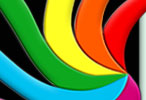 Press
Release
Press
Release
"How to be a Happy Lesbian: A Coming Out Guide" offered
to women all over the world.

Author Contact:
Tracey Stevens and Cathy Wonder
authors@amazingdreamspublishing.com
Asheville, NC
As
a community service for women coming out anywhere in the world, authors Tracey
Stevens and Cathy Wonder are offering their book How To Be A Happy Lesbian:
A Coming Out Guide as a downloadable 240 page Ebook.
Since the beginning
of this service, the PDF has been downloaded over 2,000 times from women as far
away as Australia, Sweden, Africa, and Iran, who happened to visit the Amazing
Dreams Publishing website.
In a recent interview Stevens said "I
decided to offer the coming out guide as an Ebook for women who are uncomfortable,
or scared, to go in a bookstore and buy it. There are women living in countries
where they can not buy a book like this because they could go to prison or even
be executed! I really feel that this book needs to be available for any one in
the world who needs it. There are no other books that cover all the topics that
Kathy and I have, and everyone who has reviewed our book has said that it will
benefit all lesbians, not just those who are coming out."
Free
Publication Interview
with Author and Founder of
Amazing Dreams Publishing,
Tracey Stevens:
NOTE
TO EDITORS: The full interview shown below is available for use in your publication.
You may use all or part of the interview free of charge, as long as quotes are
not used out of context so that the meaning is changed. In return, Amazing Dreams
Publishing would appreciate copies of the printed version, or links to the website
page, where the interview will appear.
Author
photos in different sizes and resolutions are available for download. If you need
something that is not available in our press area, please Contact
Us,
and we will do our best to supply whatever you may need.
Information
listed below:
Interview Contacts:
Tracey Stevens and Cathy Wonder
authors@amazingdreamspublishing.com
Interview
with Tracey Stevens
Author of lesbian fiction and nonfiction titles
Interviewer (I): Your book How To Be
a Happy Lesbian: A Coming Out Guide has been a tremendous success. Did you have
any idea it would be so well-received?
Tracey
Stevens (TS): I knew there was a real need out there for this kind
of book, but I had no idea I’d be getting such wonderful reviews and emails
from places like Pakistan, and Iran, and Africa.
I:
What made you decide to write the book?
TS:
I had written several novels, and I had tried to include helpful information
and get points across in them in a fictional way, but then my mentor, Patricia
Nell Warren, said, "Why don’t you write a nonfiction book about how
to be a healthy lesbian to get your message across?"
I: Warren
is a fiction writer. . .
TS: That’s
right. She’s been hugely successful with her novels since back in the ’70s,
beginning with The Front Runner. I have to give her a tremendous amount
of credit for not only encouraging me to write the coming out guide, but also
for her support. She is a very giving person, which isn’t always the case
with authors who’ve had as much success as she has.
I:
She’s certainly complimentary in her comments on your book cover.
She says "This (book) could be called The Lesbian Encyclopedia...."
So you’ve included a lot more than just tips on "coming out" in
it.
TS: I spent over a year doing
research for the book, and I just found so much information I thought would be
helpful. I wanted to include as much as I could, in addition to writing about
my own experiences. Patricia encouraged me to share information about my own life
with readers, too, and I did. I didn’t want it to be a dry "clinical"
book.
I: Was it difficult to divulge
that very personal information?
TS: I
fought it for a long time. I guess I didn’t want to expose myself in that
way. To actually write about myself was sort of scary.
I:
You’d be, in essence, "coming out" yourself.
TS: Well, I had been out for years, but not
in print like that to the world.
I: How
did you overcome your fear?
TS:
I started thinking about what kind of nonfiction book I would have wanted when
I was coming out, and I thought about what I could do that would really help a
lot of people. I realized that just by sharing my own personal experiences, sort
of like a "big sister," I could reach a lot of women who are going through
what I went through. . . What most lesbians probably go through at some point.
I also asked my partner, Cathy Wonder, if she would be willing to write
some chapters from her perspective as a professional counselor, which she did.
She wrote the chapters on communications (in relationships) and on counseling.
A lot of women when they first come out have no support system and end up going
into therapy— I did— and I wanted them to know what to expect.
I: What is Kathy’s background?
TS: She’s a licensed professional counselor;
she’s been working in the mental health field for thirteen years. We’ve
gotten great feedback on her chapters. She even included information for therapists
who may want to work with gay people but haven’t had much experience with
them.
I: I know you turned 40 just
a few weeks after finishing the book. How long had you known you were gay?
TS: Well, I had known since I was very
young, but I actually put a label on it at 15.
I:
So you’d been "out" yourself for 25 years when you wrote
the coming out guide?
TS: I’d
been out to my friends and people close to me since I was about 18; but I had
been out to people at work—and employers—for 7 or 8 years.
I: And did you encounter problems in the "working
world?" Were you ever discriminated against because you are a lesbian?
TS: Yes. I was fired several times when
my employers found out I was gay. With one where I had worked for three years—
I was head buyer for a store in Florida— I was up for a promotion and they
fired me when they found out I was gay. Later, I made sure that my employers knew
ahead of time, before I ever took a job, and that they were OK with it.
I: I imagine it’s hard to counsel your
readers to come out when you know they may face the same kinds of problems.
TS: In the book I don’t "tell"
women to come out. That’s a decision they have to make on their own, weighing
whether it’s harder to live a lie than face these issues. My goal with the
book is to help women who do come out to find support, to steer them toward finding
it and to living a happy life in spite of the problems.
I:
Who did you have in mind as your "target audience" as you
were writing the book?
TS: Originally
I was thinking about older women who were having problems in their sex life, but
then as it grew into this coming out guide, I was thinking more about the 16-
to 25-year-old range. Now a lot of the reviewers have said it’s helpful for
all ages, for women in and out of the closet. My guess is a lot of different age
women are buying it. But I don’t have any way to track that.
You
know, at first I was going to just write a sex guide.
I:
A book on how to have satisfying lesbian sex?
TS:
Well. . .Sort of a "how to make love to a woman" handbook.
I had a background of sexual abuse and I’d been struggling with issues surrounding
sex for years because of it. So when I was younger I read everything I could get
my hands on--about sexuality--to try to understand what happened to me. In the
process I learned a lot about technique. You know, if you go to an incest group
you’ll find out that a lot of these women are "good at sex." We’ve
been driven to know more about it to try to make sense out of what happened to
us.
Anyway, I wanted to help women come to grips with their own sexuality
and help them deal with problems I’d worked through. But then, as I started
doing research for the book I realized there was so much more information I could
share with readers. So the book grew. For example, I have a section on famous
gay and bi women. We need role models. I had no idea until I got into the research
how many famous people are--or were--gay or lesbian. I thought it would empower
people to know about them; it empowered me.
I:
You included a big section on movies as well. Why?
TS:
Movies are such a huge thing in our lives, and we look for role models
in movies. When I did research I found that there were mostly negative images
of gays and lesbians in Hollywood movies. It was really disturbing. For years
we were portrayed as drug addicts and criminals and perverts. And we died at the
end every time. Often it was: Lesbian attacks straight woman and then pays for
it with her life! Fortunately, that’s beginning to change; it’s getting
better. I list more than 50 movies in the book, along with short reviews, that
are available on DVD now; a lot of them are very good.
I:
When you finished the book did you approach traditional publishers
with it?
TS: I did, but I wasn’t
surprised that they didn’t want to publish it. Before I ever wrote the coming
out guide, I’d written several novels with lesbian characters. For ten years,
I’d tried to get them published but was turned down.
I:
Do you think it was the lesbian subject matter?
TS:
Sometimes yes, but not always. I found that the smaller publishers
who didn’t object to the subject matter were struggling financially and were
just afraid to take a chance on a new writer. I did get very positive feedback
from several of the women’s publishing companies; they were just scared to
take the risk for financial reasons. But most of the big houses, the "big
boys," were just saying "no way."
I:
Because of the subject matter?
TS:
Right. I went through those years of rejections feeling really defeated
but I didn’t want to totally give up. Then when I came into contact with
Patricia Nell Warren, she encouraged me to start my own publishing company. She
had bought back the rights to her books from the big publisher she was with originally,
and she started Wildcat Press, her own company. She said, "Tracey, publish
your own books. You have no control over your own work when someone else is handling
it."
I: So you launched Amazing
Dreams Publishing.
TS: Yes, and it
was tough. I was a full-time graphic designer at a book distributor, and between
my job and the publishing company, I was working 60- to 80-hour weeks. Fortunately,
now I work totally for myself.
I: Writing
and running the publishing company?
TS: And
AD Graphic Design.
I’m a graphic designer and book designer. So, you know, when Patricia said
I should publish my books myself, it made sense. I had the background to do it.
I: This all sounds too good. . .
Is there a downside anywhere? For instance, have you gotten any hate mail about
the book?
TS: The feedback has been
positive. I’ve gotten lots of personal emails from women thanking me and
telling me how the book has helped them in some way.
I:
And you now have an online support group from this book?
TS:
Yes--with over 850 members from all over the world. When I have someone
living in Iran email me that they are glad we have a website and books that support
them, because they could be killed for coming out as a lesbian in their country,
it makes me know that I am finally doing what I am supposed to on the earth. The
Internet is an amazing tool, helping people to reach out when they need to feel
support or find information to help them in their lives.
I:
So how did the support group come about?
TS:
The coming out guide was written primarily for young women who were
coming out, but women of all ages, and from all parts of the world, were buying
the book both printed and in Ebook form--I think the Ebook has been downloaded
around 2,500 times. After it had been available for a few months, I had one woman
email me that she really loved the book, but she felt there were issues that were
not covered in it, such as women who are married with kids and finding out later
in life that they are lesbian.
I agreed with her. The book was written
for everyone, but it dealt with more issues single women who are just coming out
would have, so I decided to start the support group to help with a need that had
not been met in the book. I had no idea that there were so many women who were
in her same situation, and I guess this woman emailing me was a pretty important
thing, because over two-thirds of our members are, or have been, married to men
and many have kids. I would have never thought this in a million years, but it's
amazing how things work out for the best, and I do believe that this support group
is the most important thing I have done in my life so far.
I:
Really?
TS: Yes. We have
saved several members from suicide, and we have some members who live in countries
where being lesbian could get you imprisoned or even executed, so the group has
developed into an amazing place of support and friendship. We have many members
who live in rural communities with little or no education, and we are providing
them with the support they need to make changes in their lives.
I:
Do bisexual or women just questioning their sexuality join?
TS: Of course. I don't care if a woman is
lesbian, bi, straight, or whatever. If she feels she needs help coping with her
sexual orientation, we are there for her. I have said many times that if a person
joins and decides she is straight that is fine with me. I just want everyone to
be happy in their lives, no matter what they may be, and that goes for straight
women and men too.
I: Speaking of
which, I understand that you've done a spin-off book that includes just the sex
tips?
TS: Yes, not long after the
coming out guide was published I produced a second smaller book called "Lesbian
Sex Tips: A Guide for Anyone Who Wants To Bring Pleasure to the Woman She (Or
He) Loves." I rewrote the material for men and women because I've met a lot
of straight women who are dissatisfied with their sex life, and a lot of men who
say they have no idea how to please a woman. They don't know anything about a
woman's body.
I guess because I'm a lesbian a number of men have felt
safe asking me about this. Men have actually asked me, "How do you do it?"
And they've asked me for tips on how to satisfy a woman. So it's really written
for straight and lesbian or bisexual people. And it's not just a "how to
do it" handbook. There's a section on safer sex, which is so important today
with AIDS and the high number of cases of STDs (sexually transmitted diseases)
in both the straight and gay populations. We included Kathy's chapters on therapy
and communication in relationships, too.
People can purchase the Ebook
from our website, www.amazingdreamspublishing.com. That version is in a package
deal that includes several other Ebooks, including two with over 100 sensual illustrations
each.
I: I noticed on your website
that you're also offering free Ecards for women. What made you decide to do that?
TS: I'm sure you've heard straight people
complain about not being able to find good greeting cards. Well, you can imagine
how hard it is for gay people. I got the idea to offer a line of Ecards for lesbians
when I couldn't find a decent card to send to Kathy on our anniversary. I wanted
to send her an Ecard at work and there was nothing appropriate out there. The
only ones I found were pornographic. There was a real need to have decent Ecards
for women.
I started out with Ecards I designed, and we now have a huge
whole gallery with over 1,500 Ecards from over 30 artists. Each artist has fifteen
to twenty designs of their work, a web page about them and how they create their
art, and a link to their own website or online store if they have one.
I: Do you have to be a lesbian artist to be
in the Ecard gallery?
TS: No. Any
good, open-minded, artist can join. The only requirement is that the artist can
not be homophobic, and we will not feature artwork that is pornographic.
I: How many people are using the Ecard site?
TS: The first month the gallery was online,
we had over 11,000 hits to it, and now we get over two million hits from over
150,000 people a month! Lots of people use it. Straight men are even using the
site to send cards to their wives and girlfriends.
I:
What other products or services does Amazing Dreams Publishing offer?
TS: We also feature a Coming Out section
on our website that lists over 100 online resources, the top 100 lesbian movie
reviews, the daily LGBT news headlines, a lesbian pride store, advice on lesbian
online dating, and regional lesbian networking groups.
In the future,
I'm hoping to be able to publish other quality books by women. We're not quite
ready for that step at this point. But I do help authors who want to self-publish.
Print on demand, POD, is a great way for them to go if they want to get their
books out there, if they've been turned down by traditional publishers.
I: You seem to have mapped out your company's
future. . . What about personal goals?
TS: My
dream since I was very young has been to create a community where women can live
together and work together in a safe haven. So my biggest goal is to have a large
tract of land somewhere here in the mountains of North Carolina where Kathy and
I can have a conference center that offers all kinds of workshops and seminars.
. . Writing conferences, relationship seminars--Kathy can offer counseling services.
Another thing: I'm very much into horses; I've
had horses all my life, and
at some point I want to incorporate my knowledge of horses and provide therapeutic
programs for people who've been abused.
I: Therapeutic
how?
TS: When I was little the only
thing that saved my life was my horse. I was a small person who was able to ride
on a very large, powerful animal. He gave me so much strength that I made it through
those years of being abused. When I was on him, I felt safe.
Children
who're abused, especially physically or sexually, feel out of control of their
environment--which they are. But if you put a child like that with a horse in
a ring and the control that huge animal's movements--and they learn to communicate
with horses on that level--it's an amazing and profound thing that happens. The
experience is incredibly helpful in building these kids' self-esteem. Horses are
great therapists.
I: Sounds like
you're going to be busy—writing, running a publishing company, a graphic
design business, a retreat center, a therapeutic horse program. . .
TS:
I know I'll be juggling a lot for a while, but if building the community
pans out, I will probably scale down the graphic design business. I think my real
purpose in life is to help people. I think I experienced abuse as a child so that
I could eventually help other people who've gone through it. I think that's why
I'm here.
And I know I won't stop writing. We're bringing out two of
my novels over the next year--"Chalice of the Goddess," a romance set
in England in the 1300s, and a thriller/serial killer book, which we are still
deciding on a title for that one. Kathy and I are also working on another self-help
book on lesbian relationships.
I: And
are the main characters in the novels lesbians?
TS:
Of course!!
***
Interviewer Bio:
Susan Snowden is a professional journalist and
book editor based in western North Carolina. During her career she has interviewed
numerous authors, including Tennessee Williams, James Dickey, Olive Ann Burns,
William Price Fox, Dr. Lee Salk, and others. 








